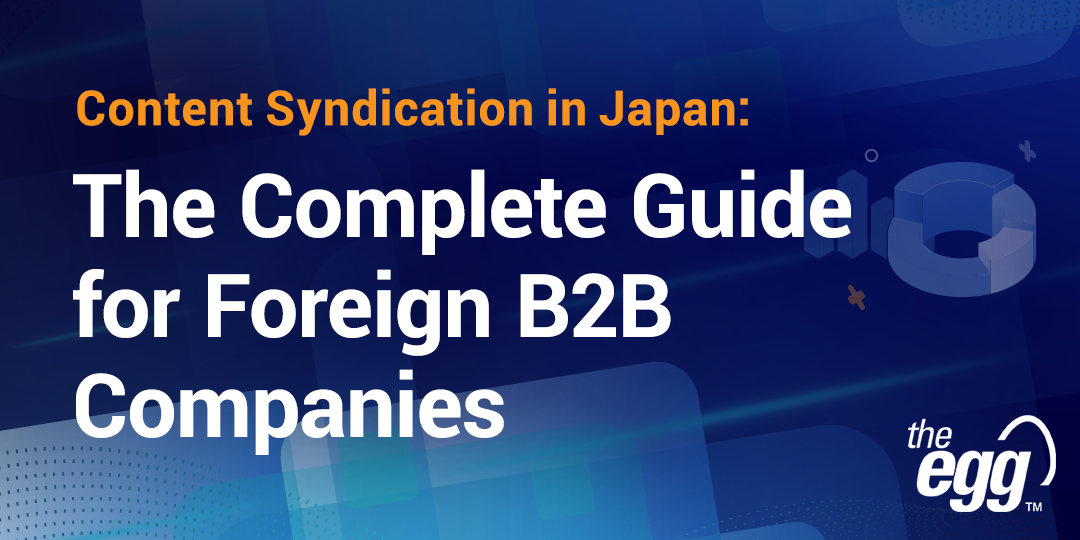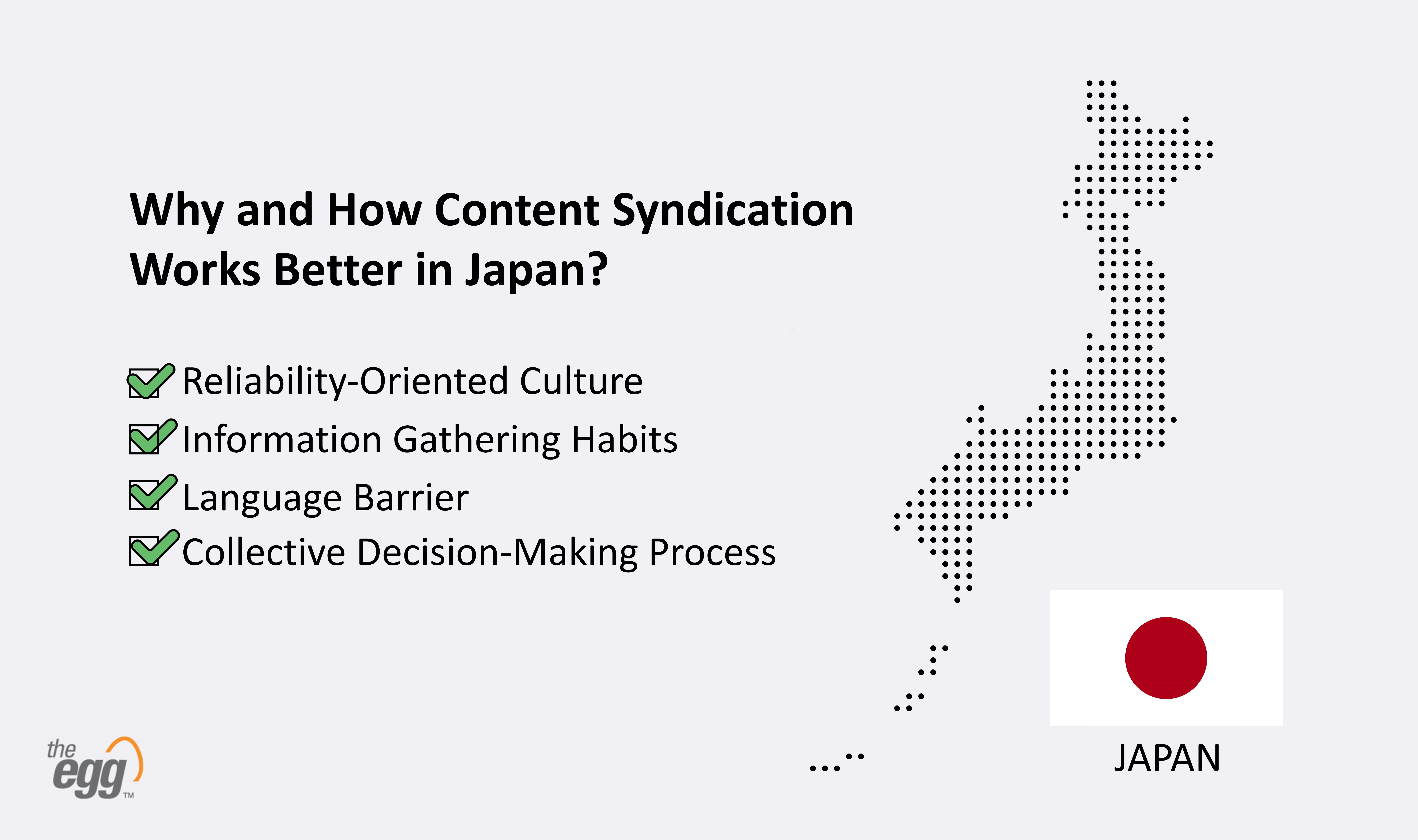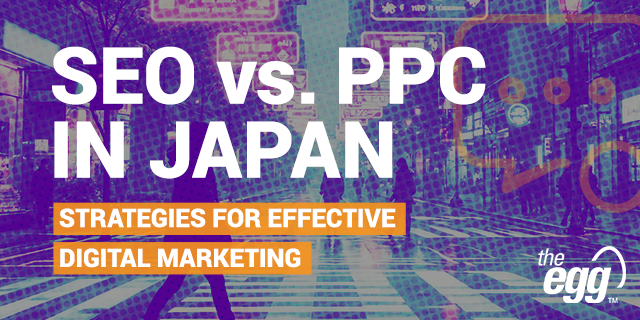Content Syndication in Japan: The Complete Guide for Foreign B2B Companies

Navigating the Japanese market can be challenging for foreign B2B companies but understanding Content Syndication can open new doors. That’s why we’ve crafted a detailed guide tailored specifically to help you leverage Content Syndication for successful business expansion in Japan.
The digital marketing landscape in Japan is unique and has distinct characteristics compared to other countries. In this article, we’ll cover the fundamentals and applications of Content Syndication in an easy-to-understand manner, with specific examples that take these differences into account.
What is Content Syndication and how is it different in Japan?
Content Syndication is a strategy where companies redistribute content (such as articles, white papers, videos, etc.) on other websites or platforms with the goal of broadening the reach of your content and engaging with new audiences.
In Europe and the United States, Content Syndication typically takes the following forms:
- Organic Syndication: Providing high-quality content to other sites for free, primarily to gain backlinks.
- Partnership-based Syndication: Partnering with specific media outlets or platforms to regularly distribute content.
- Paid Syndication: Distributing content for a fee through major media sites and content distribution networks.
In other parts of Asia, it varies:
- In China, focus is placed on local platforms like WeChat, Weibo and Zhihu with a strong emphasis on KOL (Key Opinion Leader) partnerships. Additionally, compliance with strict government regulations is required for content distribution.
- In Southeast Asia, there are multi-language syndication requirements, a heavy focus on social media, and a need for mobile-optimized content.
However, Content Syndication in Japan has evolved in a unique way,
- Emphasis on Media Partnerships: In Japan, partnerships with trusted major media outlets are crucial. For instance, collaborations with industry-specific media such as Nikkei Business and IT Media are common.
- Focus on Lead Generation: In the Japanese B2B market, Content Syndication is often used not only for brand awareness but also as a targeted lead generation tool.
- Localization of Content: Content must be adapted to Japanese business practices and culture, not just translated.
- Long-term Relationship Building: Japanese companies generally prefer ongoing Content Syndication programs over one-time campaigns.
- Privacy Considerations: Japanese companies are highly conscious of privacy and require a more cautious approach when acquiring leads.
Here’s an example:
A U.S.-based cloud security solutions company employed a targeted content syndication strategy to enter the Japanese market. While in the U.S. and Europe, the strategy involved broad distribution of English-language white papers through global platforms like LinkedIn and TechCrunch, the approach for Japan was more localized. The company partnered with IT Media to regularly contribute security-related articles, published case studies for Japanese companies through sponsored content on Nikkei xTECH, and shared product information and expert reviews on business software comparison sites. This strategy effectively increased the company’s visibility in the Japanese market and generated high-quality leads.
Why and How Content Syndication Works Better in Japan
Japan’s unique business environment and cultural background make Content Syndication an especially effective strategy. Here’s why:

- Reliability-Oriented Culture: Japanese business culture places a high value on reliability and a proven track record, which makes companies in Japan cautious when adopting new products and services. Syndicating content through trusted major media outlets can significantly enhance brand credibility and ease potential customers’ concerns. For example, partnering with an authoritative business publication like Nikkei BP allows foreign companies to quickly build credibility in the Japanese market.
- Information Gathering Habits: Japanese business professionals have a strong habit of staying informed about industry trends and new technologies. Regularly syndicated content effectively meets this information-gathering need, fostering ongoing reader engagement. For example, a regular column in a specialized media outlet such as IT Media can help you consistently reach technology decision-makers.
- Language Barrier: Many Japanese business professionals prefer content in Japanese over English. High-quality content created in Japanese will reach a broader audience and foster deeper understanding. For example, creating fully localized content, including Japanese case studies and statistics, rather than merely translating from English, makes it easier to resonate with readers.
- Collective Decision-Making Process: Decision-making in Japanese companies often involves multiple departments and executives, following a collective approach. Content Syndication supports this complex decision-making process by providing information from various perspectives. Examples include using IT Media for technical content and Nikkei Business for business value. .
These factors highlight the strategic importance of Content Syndication in the Japanese market, emphasizing its role beyond mere content distribution. For foreign B2B companies, understanding and leveraging these characteristics is critical to achieving success in Japan.
How Lead Generation Works with Content Syndication
In the Japanese market, Content Syndication goes beyond mere information dissemination and serves as a powerful lead generation tool. This section provides a detailed overview of how it works and how to set criteria for qualifying leads.
BASIC Lead Generation Process

The process begins with content creation and placement, where high-quality and valuable content, such as white papers, eBooks, and webinars, is developed and placed on the chosen media partner’s platform. This sets the stage for user engagement, as the media audience interacts with and accesses the content. During this interaction, an information exchange occurs where users provide personal information, such as their name, email address, and company name, in order to access the content. The media partners then collect this information and filter it according to predefined criteria in a step known as lead information collection. Subsequently, in the lead receipt stage, the high-quality lead information is passed on to the client, who originally provided the content. Finally, the client follows up appropriately with the leads based on the information received.
Ready to maximize your digital marketing in Japan?
Filtering for High Quality Leads
In the Japanese market, the following criteria are commonly used to ensure the quality of lead information:
- Company size (no. of employees or annual sales)
- Industry
- Job Title
- Department
- Interests
- Buying Stage (consider which stage of the buying process are they in)
- Geography (regions or cities)
- Planned Introduction Period
examples of Lead Generation Mechanisms used in Japan
Content syndication in Japan uses the following mechanisms for lead generation:
- Attack List Matching
- Company names and corporate numbers from the client’s attack list (target company list) are matched with the data owned by each media outlet.
- Match rates are calculated, and data consistency is verified between the client and the media partner.
- ABM (Account-Based Marketing) Approach
- Only personal data associated with the target accounts (specific companies) specified by the client is provided as leads.
- This approach allows for a focused effort on acquiring leads from strategically important companies.
- Limiting Duplicate Leads
- A system is in place to limit the number of leads generated from the same account company.
- This prevents the generation of excessive leads from a single company, ensuring efficient lead management.
- Elimination of Personal Email Addresses
- Only business email addresses are collected, excluding leads with personal email addresses such as Gmail or Yahoo.
- This ensures that the leads gathered are more relevant and valuable for your B2B marketing efforts.
- Outbound Calls
- Some media outlets conduct outbound calls to specific account companies to enhance lead quality.
- This provides clients with a more detailed understanding of the lead’s intentions and interests.
LEAD Count Guarantee System
Content syndication services in Japan often use a lead count guarantee system to ensure a strong return on the client’s investment. This approach begins with a guaranteed minimum number of leads, set at the start of each campaign. For example, a campaign may guarantee a minimum of 100 leads over a three-month period. Additionally, many media outlets offer an extension option, allowing the campaign to be extended at no extra cost if the target number of leads is not achieved within the specified timeframe. To maintain transparency and keep clients informed, real-time reporting is provided through a dashboard, enabling clients to monitor their lead acquisition status as it unfolds.
Cost Per Lead
Understanding the cost structure is crucial for budgeting and evaluating the ROI of Content Syndication campaigns in Japan. The cost per lead can vary based on the targeting criteria and methods used:
- General Criteria: When using broader targeting criteria such as company size and industry, the cost per lead typically ranges from US$100 to US$200.
- Advanced Targeting: For more sophisticated approaches combining Account-Based Marketing (ABM) and outbound calls, the cost per lead increases, potentially reaching US$300 to US$500.
It’s important to note that these figures are approximate and can vary based on factors such as the specific media outlet, the complexity of your targeting criteria, and the current market conditions. When planning your Content Syndication strategy, consider balancing the quality of leads with the associated costs to optimize your marketing budget.
Such a system allows clients to achieve predictable results and a solid return on investment (ROI), enabling effective lead generation in the Japanese market.
sUitable Media Selection for Content Syndication
To effectively implement content syndication in the Japanese market, selecting the right media partner is crucial. The right choice can significantly enhance your content strategy by leveraging the distinct specializations and attributes of various media platforms:
Specializations of Media Platforms:
Different platforms bring unique strengths to the table:
- Some platforms like Nikkei Business and Nikkei X-Tech specialize in economic and business news, reaching executives and decision-makers in multiple industries.
- Others like IT Media specializes in IT content, catering to audiences ranging from engineers to executives, with a strong emphasis on industry trends and technical insights.
- Comparison and search platforms for business software and cloud services offer valuable user reviews and expert ratings.
- For IT decision-makers, there are platforms offering professional information with in-depth technical details and purchasing support.
Distinctive Attributes:
Media platforms are also recognized for their distinctive features:
- Extensive Coverage: Certain platforms offer extensive coverage of digital transformation (DX), providing rich content on business strategies and management issues.
- In-Depth Technical Information: Some platforms excel in delivering in-depth technical information alongside industry trends, with a focus on reaching broad audiences.
- Sub-Media Channels: Larger publishers may offer sub-media channels focused on specific target segments, which allows for more precise audience engagement.
- Variety of Content Formats: Many platforms provide various content formats, including white papers and webinars, catering to diverse audience preferences.
- Specialized Product Comparisons: Specific platforms facilitate specialized product comparisons and expert ratings, with ranked lists to aid in lead acquisition.
Suitable Industries and Purposes:
By choosing the right media platform, you align with industry-specific needs:
- Platforms ideal for B2B solutions cater to large companies focusing on business strategy and brand awareness.
- IT infrastructure, security, and cloud services find suitable platforms that emphasize detailed technical product or service descriptions.
- SaaS products and business solutions for small and medium-sized enterprises benefit from targeted platforms to increase product awareness and capture leads.
- Products designed for large enterprises may benefit from platforms that offer detailed lead scoring systems to effectively target decision makers.
Impact of Choosing the Right Media Platform:
The impact of selecting the correct media platform for content syndication is evident in the success stories of various companies:
- Case Study 1: A global ERP (Enterprise Resource Planning) vendor introduced industry-specific case studies, generating over 200 high-quality leads in 3 months and leading to advanced business negotiations.
- Case Study 2: A cloud security provider’s series on “Zero Trust Security” yielded over 500 leads in 6 months, significantly boosting brand awareness.
- Case Study 3: A CRM tool provider’s free trial campaign led to 150 qualified leads in just 2 months, with a 30% conversion rate to trial sign-ups.
- Case Study 4: A network equipment manufacturer’s white paper on “Software-Defined Networking (SDN)” resulted in 300 leads and 50 demo requests in 3 months.
What is the Right Content for Content Syndication?
To achieve effective Content Syndication, it is crucial to select and create appropriate content. This section provides a detailed explanation of the best types of content for lead acquisition, tailored to the characteristics of the Japanese market.

- White Paper: Long-form content pieces that provide detailed information, making them ideal for demonstrating expertise and credibility. Effective white papers might include industry trend analysis and forecasts, detailed explanations of technology and its implementation benefits, and solutions for specific problems.
For instance, a foreign company offering cloud storage services published a white paper titled “A Guide to Optimizing Data Governance for Japanese Companies.” By syndicating this through IT Media, they acquired 200 high-quality leads in one month, with an impressive 30% converting into concrete business negotiations.
- Case Study: Case studies showcase the value of products and services through real-world success stories, which are highly valued by Japanese companies, particularly those looking for examples from their own industry. Effective case studies include specific challenges and solution processes, demonstrate both quantitative and qualitative benefits of implementation, and incorporate testimonials and recommendations from clients.
A notable success story involved an ERP (Enterprise Resource Planning) solution provider that published a case study in Nikkei X-TECH, detailing its implementation at a major Japanese manufacturing company. This effort resulted in 150 leads over three months, with 10 of those leading to actual demo requests.
The key to success in Content Syndication in the Japanese market lies in selecting and creating content that aligns with the characteristics of your products and services, as well as your target customer base.
Ready to maximize your digital marketing in Japan?
The Japan Act on the Protection of Personal Information and Content Syndication
When implementing Content Syndication in Japan, compliance with The Japan Act on the Protection of Personal Information (APPI) is critical. Understanding and adhering to this law is essential for foreign B2B companies to effectively capture and utilize leads in the Japanese market.
OVerview of APPI
The Act on the Protection of Personal Information (APPI) is a Japanese law that governs the proper handling of personal information. It was significantly revised in 2017 and further updated in 2022. The law applies to all businesses that handle personal information.
Key Provisions:
- Definition of Personal Information: Clarifies what constitutes personal information.
- Rules on Acquisition, Use, Storage, and Provision to Third Parties: Sets out guidelines for the proper handling of personal information.
- Consent and Notification Requirements: Requires obtaining consent from individuals and notifying them of how their information will be used.
- Obligations for Safety Control Measures: Mandates the implementation of appropriate security measures to protect personal information.
- Transparency in Handling Personal Information: Ensures individuals are informed about how their personal information is managed.
IMpact of APPI on Content Syndication
Understanding the Definition of Personal Information
- Lead information (e.g., name, email address, company name) obtained through Content Syndication is classified as personal information.
- IP addresses and cookie data may also be considered personal information if they can be easily linked to identifiable individuals.
Appropriate Acquisition of Personal Information
- When acquiring leads, the purpose of use must be clearly stated, and the individual’s consent must be obtained.
- Example: “By downloading this white paper, you agree to receive product information from us.”
Restrictions on Providing Information to Third Parties
- When receiving lead information from media partners, it is essential to obtain the individual’s consent.
- Using an opt-in method, where explicit consent is obtained beforehand, is highly recommended.
Support for Cross-Border Data Transfer
- Additional measures are required when transferring lead information obtained in Japan to headquarters or other overseas locations.
- This includes ensuring the adequacy of the personal information protection system in the destination country and implementing appropriate security measures.
best Practices for Compliance with APPI in Content Syndication
Optimize the Consent Acquisition Process
- Clearly and concisely obtain consent on lead acquisition forms.
- Example: “□ I agree with the privacy policy and wish to receive product information.”
Agreements with Media Partners
- Establish contracts that clearly define the scope of responsibility for handling personal information.
- Specifically outline data retention periods, deletion methods, security standards, and more.
Provision of Opt-Out Functions
- Provide an easy opt-out mechanism for marketing activities using lead information.
- Example: Always include an “unsubscribe” link in email newsletters.
For Content Syndication to succeed in Japan, proper compliance with APPI is essential, along with an effective content strategy and media selection. Compliance is not just a legal obligation; it is the foundation for building trust and achieving sustainable success in the Japanese market.
Should Content Syndication Be A Part Of Your Marketing Strategy In Japan?
Content Syndication in the Japanese market offers significant opportunities for foreign B2B companies. However, success in this area requires a deep understanding of the unique characteristics of the Japanese market, the development of tailored strategies, and a commitment to continuous improvement.
By taking into account the various factors discussed in this article and aligning your Content Syndication strategy with your products, services, and objectives, you can effectively increase brand awareness, generate leads, and ultimately drive sales in the Japanese market.
It’s important to recognize that the lead volumes and performance metrics from specific case studies mentioned above may not reflect outcomes across all industries. Performance can vary significantly depending on factors such as industry sector, target audience demographics, and campaign specifics. Therefore, for a more tailored approach, consider consulting with experts, like The Egg, to discuss your unique requirements and receive a customized assessment of content syndication opportunities in the Japanese market.
While the Japanese market is unique, and the barriers to entry may appear high, leveraging Content Syndication effectively and building strong relationships with Japanese companies can ensure your long-term success.
We sincerely wish you success in the Japanese market. Good luck!





